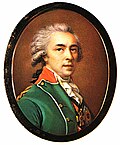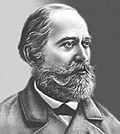Alphabetical list
A
- Valery Alekseyev (1929–1991), anthropologist, proposed Homo rudolfensis
- Mikhail Artamonov (1898–1972), historian and archaeologist, founder of modern Khazar studies, excavated a great number of Scythian and Khazar kurgans and settlements, including the fortress of Sarkel
- Artemiy Artsikhovsky (1902–1978), archaeologist, discoverer of birch bark documents in Novgorod
B
- Vasily Bartold (1869–1930), turkologist, the "Gibbon of Turkestan", an archaeologist of Samarcand
- Konstantin Bestuzhev-Ryumin (1829–1897), 19th-century historian and paleographer, founder of the Bestuzhev Courses for women
- Nikita Bichurin (1777–1853), a founder of Sinology, published many documents on Chinese and Mongolian history, opened the first Chinese-language school in Russia
- Boris Hessen (1893–1936), physicist who brought externalism into modern historiography of science
D
- Dmitry Ilovaysky (1832–1920), 19th-century anti-Normanist
- Igor Diakonov (1915–1999), historian and linguist, researcher of Sumer and Assyria
- Dimitri Obolensky (1918–2001), historian and Byzantinist
F
- Boris Farmakovsky (1870–1928), archaeologist of Ancient Greek colony Olbia
- Friedrich von Adelung (1768–1843), historian and museologist, researched the European accounts of the Time of Troubles
G

- Vladimir Golenishchev (1856–1947), egyptologist, excavated Wadi Hammamat, discovered over 6,000 antiquities, including the Moscow Mathematical Papyrus , the Story of Wenamun , and various Fayum portraits
- Timofey Granovsky (1813–1855), a founder of mediaeval studies in Russia, disproved the historicity of Vineta
- Boris Grekov (1882–1953), researcher of Kievan Rus' and Golden Horde
- Alexander V. Gordon (born 1937), researcher of the French Revolution, Third world and Peasantry
- Vladimir Guerrier (1837–1919), historian of the French Revolution, founder of the Courses Guerrier for women
- Lev Gumilev (1912–1992), historian and ethnologist, researcher of ancient Central Asian peoples, related ethnogenesis and biosphere, influenced the rise of Neo-Eurasianism
H
I
- Igor Diakonov (1915–1999), historian and linguist, researcher of Sumer and Assyria
- Igor Kurukin (born 1953), specialist in the history of Russia of the 16th–18th centuries
K

- Alexander Kamensky (born 1954), a historian specializing in the history of 18th-century Russia.
- Konstantin Kapkov (born 1969), a historian of the reign of Nicholas II and the history of the Russian Orthodox church.
- Pyotr Kafarov (1817–1878), sinologist, discovered many invaluable manuscripts, including The Secret History of the Mongols
- Nikolai Karamzin (1766–1826), sentimentalist writer, historian and manuscript collector, author of the 12-volume History of the Russian State
- Vasily Klyuchevsky (1841–1911), played influential role in Russian historiography around 1900, shifted focus from politics and society to geography and economy
- Alexander Kazhdan (1922–1997), Byzantinist, editor of the Oxford Dictionary of Byzantium
- Nikodim Kondakov (1844–1925), researcher of Byzantine art
- Andrey Korotayev (born 1961), historian and anthropologist, a founder of cliodynamics, developer of social cycle theory
- Stanislaw Kuczera , (1928–2020), sinologist and archaeologist
- Sergey Kovalev (1886–1960), scholar of classical antiquity
- Nikolay Kun (1877–1940), historian, writer and educator
- Yelena Yefimovna Kuzmina (1931–2013), researcher of prehistory of Indo-Aryan peoples
L
- Platon Levshin (1737–1812), president of the Most Holy Synod during the Age of Enlightenment, author of the first systematic course of the history of Russian Orthodox Church
- Nikolay Likhachyov (1862–1936), first and foremost Russian sigillographer, also in a number of other auxiliary historical disciplines
- Aleksey Lobanov-Rostovsky (1824–1896), statesman, published the major Russian Genealogical Book
- Mikhail Lomonosov (1711–1765), polymath scientist and artist, the first opponent of the Normanist theory, published an early account of Russian history
- Matvei Lyubavsky (1860–1936) historian of ancient Russian history
M

- Mikhail Artamonov (1898–1972), historian and archaeologist, founder of modern Khazar studies, excavated a great number of Scythian and Khazar kurgans and settlements, including the fortress of Sarkel
- Mykola Kostomarov (1817–1885), Russian–Ukrainian historian, folklorist and romantic writer, researched the differences between Great Russia and Little Russia and the history of Ukraine

Klyuchevsky - Pyotr Kozlov (1863–1935), explorer of Central Asia, discoverer of the ancient Tangut city of Khara-Khoto and Xiongnu royal burials at Noin-Ula
N
- Nikolay Danilevsky (1822–1885), ethnologist, philosopher and historian, a founder of Eurasianism, the first to present an account of history as a series of distinct civilisations
M
- Madhavan K. Palat (born 1947), since 1989 Professor of Russian and European History, Jawaharlal Nehru University, Delhi, India. Visiting Professor of Imperial Russian History at the University of Chicago (2006).
- Boris Marshak (1933–2006), excavated the Sogdian ruins at Panjakent
- Friedrich Martens (1845–1909), legal historian, drafted the Martens Clause of the Hague Peace Conference

Müller - Vladimir Minorsky (1877–1966), historian of Persia
- Yagutil Mishiev (born 1927), writer, author of books about the history of Derbent, Dagestan, Russia.
- Anatoly Moskvin (born 1966), linguist and historian, arrested in 2011 after the bodies of 26 mummified young women were discovered in his home.
- Gerhardt Friedrich Müller (1705–1783), co-founder of the Russian Academy of Sciences, explorer and the first academic historian of Siberia and Russia, pioneer of ethnography, put forth the Normanist theory
- Aleksei Musin-Pushkin (1744–1817), collector of Kievan Rus' manuscripts, discovered The Tale of Igor's Campaign
O
- Dimitri Obolensky (1918–2001), Byzantine commonwealth researcher
- Alexey Okladnikov (1908–1981), historian and archaeologist of Siberia and Mongolia

Musin-Pushkin - Sergey Oldenburg (1863–1934), a founder of Russian Indology and the Academic Institute of Oriental Studies
- George Ostrogorsky (1902–1976), 20th-century Byzantinist
P
- Avraamy Palitsyn (died 1626), 17th-century historian of the Time of Troubles
- Anna Pankratova (1897–1957), leading Soviet historian, educator and writer
- Evgeny Pashukanis (1891–1937), legal historian, wrote The General Theory of Law and Marxism
- Boris Piotrovsky (1908–1990), researcher of Urartu, Scythia, and Nubia, long-term director of the Hermitage Museum
- Mikhail Piotrovsky (born 1944), orientalist, current director of the Hermitage Museum
- Mikhail Pogodin (1800–1875), mid-19th-century Russian historian and textologist, proponent of the Normanist theory
- Boris Polevoy (1918–2002), major historian of the Russian Far East
- Mikhail Pokrovsky (1868-1932), Marxist historian, most prominent Soviet historian of the 1920s

Pogodin - Natalia Polosmak (born 1956), archaeologist of Pazyryk burials, discoverer of Ice Maiden mummy
- Alexander Polovtsov (1832–1909), statesman, historian and Maecenas, founder of the Russian Historian Society
- Tatyana Proskuryakova (1909–1985), Mayanist scholar and archaeologist, deciphered the ancient Maya script
R
- Semyon Remezov (ca. 1642- after 1720), cartographer and the first historian of Siberia, author of the Remezov Chronicle
- Mikhail Rostovtsev (1870–1952), archeologist and economist, the first to thoroughly examine the social and economic systems of the Ancient World, excavated Dura-Europos
- Nicholas Roerich (1874–1947), painter, archeologist, and public figure, explorer of Central Asia, initiator of the international Roerich’s Pact on protection of historical monuments
- Sergei Rudenko (1885–1969), discoverer of Scythian Pazyryk burials
- Boris Rybakov (1908–2001), historian and chief Soviet archaeologist for 40 years, primary opponent of the Normanist theory

Proskuryakova
S
- Dmitry Samokvasov (1843–1911), discoverer of Black Grave in Chernigov
- Viktor Sarianidi (1929–2013), discoverer of the Bactria-Margiana Archaeological Complex and the Bactrian Gold in Central Asia
- Aleksey Shakhmatov (1864–1920), historian and philologist, pioneer in textology, particularly textual criticism of the Primary Chronicle
- Mikhail Shcherbatov (1733–1790), a man of the Russian Enlightenment, conservative historian
- Anatoly Pavlovich Shikman (born 1948), author of Figures of Russian History and other works.
- Sergey Solovyov (1820–1879), author of the 29-volume History of Russia
- Vasily Struve (1889–1965), orientalist and historian of the Ancient World, put forth the Marxist theory of five socio-economic formations that dominated Soviet education
T
- Yevgeny Tarle (1874–1955), author of studies on Napoleon's invasion of Russia and on the Crimean War
- Vasily Tatishchev (1686–1750), statesman, geographer and historian, discovered and published Russkaya Pravda , Sudebnik of 1550 and the controversial Ioachim Chronicle ; wrote the Istoriya Rossiisskaya; has been denounced for fabrications, carelessness and untraceable claims, known as Tatishchev information.
- Mikhail Tikhomirov (1893–1965), specialist in medieval Russian paleography, contributed to the Complete Collection of Russian Chronicles (PSRL)
- Vladimir Yakovlevich Tolmachev (ru, 1876–1942), Imperial Russian and Soviet archaeologist in Manchuria
- Kamilla Trever (1892–1974), specialist in the history and culture of Transcaucasia and Central Asia
- Boris Turayev (1868–1920), author of the first full-scale History of Ancient East
- Peter Turchin (born 1957), population biologist and historian, coined the term cliodynamics
- Alexander Tyumenev (1880–1959), historian of antiquity, author of one of the first Marxist works on the history of classical societies in the Soviet Union
U
- Fyodor Uspensky (1845–1928), Byzantinist, researcher of the Trapezuntine Empire
- Aleksey Uvarov (1825–1884), founder of the first Russian archaeological society, discovered over 750 ancient kurgans
V
- Vasily Vasilievsky (1838–1899), 19th century Byzantinist
- Alexander Vasiliev (1867–1953), author of a comprehensive History of the Byzantine Empire
- Nikolay Veselovsky (1848–1918), first to excavate Afrasiab (the oldest part of Samarkand), as well as the Solokha and Maikop kurgans in Southern Russia

Solovyov - Viacheslav Petrovich Volgin (1879–1962), historian of early communist systems
Y
- Nikolai Yadrintsev (1842–1894), discoverer of Genghis Khan's capital Karakorum and the Orkhon script of ancient Türks
- Valentin Yanin (1929–2020), primary researcher of ancient birch bark documents
Z
- Gennady Zdanovich (born 1938), discoverer of Sintashta culture settlement Arkaim
- Viktor Zemskov (1946–2015), researcher of political repression in the Soviet Union between 1917 and 1954





